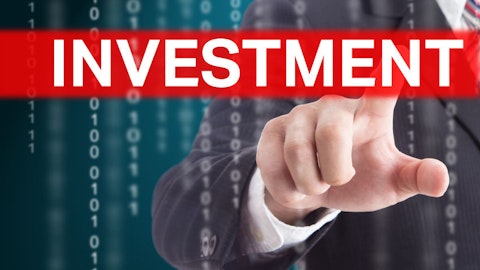Excelerate Energy, Inc. (NYSE:EE) Q2 2023 Earnings Call Transcript August 10, 2023
Operator: Good morning, ladies and gentlemen and welcome to the Excelerate Energy Second Quarter 2023 Earnings Conference Call. My name is Grant and I’ll be the operator for today’s call. After today’s presentation there will be a question and answer session. [Operator Instructions] I would now like to turn the conference over to our host, Craig Hicks, Vice President of Investor Relations and ESG. Please go ahead.
Craig Hicks: Good morning, everyone. Thank you for joining Excelerate Energy’s second quarter 2023 financial results call. Participating on the call today are Steven Kobos, President and Chief Executive Officer and Dana Armstrong, Executive Vice President and Chief Financial Officer. Also joining the call today is Daniel Bustos, Executive Vice President and Chief Commercial Officer. Our second quarter 2023 results press release and presentation were released yesterday afternoon and can be found on our website at ir.excelerateenergy.com. I would like to remind everyone that we will be making forward-looking statements on this call that involve a number of risks and uncertainties. Our actual results may differ materially from those expressed in these forward-looking statements, and we make no obligation to update or revise them.
Today’s remarks will also refer to certain non-GAAP financial measures. We have provided a reconciliation to the most directly comparable GAAP financial measures at the back of the presentation. With that, I’d like to now turn the call over to Steven Kobos, Chief Executive Officer of Excelerate Energy.
Steven Kobos: Thanks, Craig, and thank you all for joining us today for our second quarter 2023 earnings conference call. Today my remarks will touch on our financial performance during the quarter and outlook for the global LNG market for the remainder of ’23 and a review of our strategic objectives. I’ll then pass the call over to Dana, who will provide more detail on our financial results for the quarter. Excelerate reported strong financial results in the second quarter with adjusted EBITDA coming in at $89 million and net income close to $30 million. Our financial results were underpinned by the stable revenues and predictable margins that we see from our FSRU and Terminal Services business. Our consistent earnings performance during periods of volatility, and the LNG market underscores the attractiveness of Excelerate Energy as an investment opportunity.
In addition to delivering strong financial results, we also have several other notable highlights. During Q2, we secured additional LNG sales in the Bangladesh through spot tenders run by Petrobangla. Year-to-date, we have secured contracts for the sale of four spot LNG cargoes in Bangladesh. These cargoes are in addition to the gas sales activities we had in Finland earlier this year. Our ability to secure opportunistic LNG and gas sales while taking limited price risk provides us with revenue upside potential that compliments the stability of our base business. In Argentina, the FSRU Excelsior providing regasification services at the Behi Blanca gas port terminal. Following the Argentine winter, the Excelsior will return to the Germany charter in the third quarter of ’23.
Our team continued to demonstrate its technical expertise and commitment to operational excellence during the quarter. Whether it was repositioning the FSRU Excelsior from Europe to Behi Blanca, or navigating successfully a severe weather event like Cyclone Mocha in Bangladesh. I cannot be more proud of the global Excelerate team. To provide some additional context on the scale of our operations, as of June 30th, our fleet represented 29% of global sendout capacity for FSRU based terminals. Finally, on August 3rd, the Excelerate’s Board of Directors declared another $0.025 dividend per share to shareholders of record as of August 23rd. With that, let’s turn to a brief update on the global LNG market. In the first half of ’23, mild weather in Europe and the continued buildup of EU natural gas storage contributed to inventories ending the quarter 77% full.
Currently, EU storage is approximately 87% full. This is roughly three months in advance of the EU mandated target for storage levels to reach 90% of capacity by November 1st. In the Asia-Pacific region, there was muted demand in the LNG market due to improving nuclear availability in Japan and Korea and healthy LNG supply. This contributed to a more liquid market in the second quarter, which allowed South Asian countries to reenter the spot market. EU and APAC countries are focused on the coming winter. According to the IA, a cold European winter could increase natural gas consumption by about 30 billion cubic meters, or 22 million tons of LNG compared to last year’s heating season. In Asia, China’s LNG imports could fluctuate with an uncertainty range of over 10 billion cubic meters or 7.2 million tons through the winter.
The potential return of a colder winter in Europe should continue to drive the need for incremental flexible LNG regasification capacity in the regions. On the supply front, LNG markets are expected to remain tight in the near-term. The global supply and demand balance should improve after 2024, when approximately 200 million tons per annum of incremental LNG capacity begins to come online. This significant market dynamic is expected to create new opportunities for Excelerate to connect LNG to downstream customers, primarily in the Global South. U.S. Gulf Coast liquefaction projects are of particular interest to Excelerate as they represent potential sources of FOB destination free volumes that are an ideal fit for our LNG portfolio. While we continue to pursue downstream integrated opportunities, in the near-term, we are focused on strategically investing in the LNG value chain.
This includes developing our diversified portfolio of LNG supply, evaluating opportunities to grow our fleet and establishing an LNG and gas marketing platform. In addition to the 20-year LNG sales and purchase agreement we announced earlier this year with Venture Global, we’re also considering additional SPAs with other LNG producers. As we execute our plan to scale the business, having a diversified portfolio of LNG supply will allow us to offer more flexible and cost-effective products to both existing and new customers. Excelerate is in a strong position today with our existing FSRUs fully utilized and contributing to the business. That’s additional infrastructure is needed to drive growth and maintain fleet flexibility. This remains a top priority for the Excelerate team.
Last call, we announced our new build FSRU with Hyundai Heavy Industries. The state-of-the-art FSRU will be delivered in June 2026, and we look forward to welcoming to our fleet. We’re also looking at conventional LNG carriers for managing our supply volumes, and we are evaluating opportunities to acquire new FSRUs to support our integrated offerings. Finally, we’re taking a deliberate approach to increase our marching presence with the strategic goals of driving incremental margin growth and creating a bridge to some of the longer-term actions we are taking with regard to LNG supply. We plan to achieve this by pursuing a combination of gas sales agreements downstream of our FSRUs, opportunistic LNG marketing and strategic partnerships with LNG producers.
In summary, putting these important building blocks of our strategy in place, will enhance our ability to develop and deploy integrated LNG infrastructure at attractive rates of return. Now let’s turn to Bangladesh for a brief update. We continue to advance our Pirate LNG project in our SPA with Petrobangla. We’ve completed negotiations with the government of Bangladesh for a term sheet for Payra, which details the broad commercial parameters and framework for the deal. As is typical in the Government of Bangladesh approval system, the term sheet is going through its final round of approvals with various ministries within the government. We’ve also completed negotiations with the government for a proposed LNG SPA and are awaiting final approval.
Once complete, this SPA will complement our portfolio of short-term spot LNG sales, which will continue to play an important role in the market. I’ll now turn the call over to Dana, who will walk you through the details of our financial results.
Dana Armstrong: Thanks, Stephen, and good morning, everyone. We are pleased with Excelerate’s performance for the second quarter of this year. Our second quarter adjusted net income was $30 million, which is an increase of $9 million or up 45% as compared to the prior year second quarter. As compared to the first quarter of this year, our adjusted net income was slightly lower. Our second quarter adjusted EBITDA was $89 million, up $22 million or up 33% over the prior year second quarter, and up $9 million as compared to the first quarter of this year. The year-over-year increases in adjusted net income and adjusted EBITDA were primarily driven by higher charter rates for Finland and for B of Blanca in Argentina. Along with our contract extension at a higher rate in the UAE and lower operating lease expense resulting from the purchase of the FSRU Sequoia.
The quarterly sequential increase in adjusted EBITDA was driven by a full quarter of operations for the FSRU Excelsior, following the completion of its scheduled dry dock in the first quarter of 2023, and along with lower operating lease expense for the Sequoia and two LNG spot cargo cells into Bangladesh. Excelerate benefits from having a portfolio of stable long-term contracts. Today, most of our vessels are committed to long-term contracts. As of June 30, our FSRU and terminal assets have $3.5 billion of remaining contracted cash flows with the remaining weighted average life of roughly 7 years. We also benefit from the geographic diversity of our customer portfolio. Our global presence includes a mix of revenue from Europe, Asia-Pacific, the Americas and the Middle East.
In each of these regions, our FSRUs and terminal service geostrategic pinch points that enhance energy security and support local economies. Last year, our pivot to Europe in Finland and Germany allowed us to further diversify geographically and simultaneously allowed us to strengthen our counterparty credit profile. Our base business generates healthy and predictable free cash flow streams that enhance our flexibility to pursue growth opportunities that will bolster our returns on capital. Now let’s turn to our liquidity and balance sheet. As of June 30, Excelerate had $462 million of cash and cash equivalents on hand, $81 million of letters of credit issued and no outstanding borrowings under our revolver. Our gross leverage ratio was 2.6 times at the end of the second quarter compared to 2.8 times as of the first quarter.
With our strong balance sheet, we have sufficient capital to execute our growth strategy and we continue to monitor the market for accretive opportunities that align our strategy in the best interest of our shareholders. With a diverse global footprint, Excelerate is well positioned to develop and execute projects that will further our ability to generate stable, consistent returns. Next, I’ll share an update on our capital allocation strategy and our financial outlook. Our focus for now remains on preserving capital to invest in future growth opportunities. We are maintaining our prudent and disciplined approach to capital investments. We also recognize the value of returning capital to shareholders, and we’ll continue to evaluate our dividend strategy in the context of our strategic objectives.
Total CapEx for the quarter was $278 million, which included $265 million for the Sequoia purchase and roughly $5 million of maintenance CapEx related to various vessel upgrades and related vessel equipment. As a reminder, the FSRU excellence is scheduled for planned dry dock activities in the fourth quarter of this year. Because the excellence is entering build, operate transfer of boot structure, the related expenses will not be classified as maintenance CapEx. Instead, the dry dock costs for the vessel will be recognized on the income statement. To be clear, the effect of the dry dock on our fourth quarter EBITDA results is included in our full year financial guidance. Based on our results to date, we are narrowing our financial guidance for 2023.
We now expect our adjusted EBITDA to range between $325 million and $335 million. Maintenance CapEx is now expected to range between $20 million and $30 million. This concludes our remarks. With that, we’ll open up the call for Q&A.
Q&A Session
Follow El Paso Electric Co (NYSE:EE)
Follow El Paso Electric Co (NYSE:EE)
Receive real-time insider trading and news alerts
Operator: [Operator Instructions] We have our first question comes from Chris Robertson from Deutsche Bank. Chris, you line is now open.
Chris Robertson: Steven, I think you probably already addressed this during the prepared remarks, but there was a news article out yesterday in Bangladesh, citing that the government has approved the proposal for Excelerate to supply 1 to 1.5 MTPA of LNG for 15 years starting in 2026 which does seem to align with the time line for the delivery of the new building vessels. So I was wondering if you could just address that article.
Steven Kobos: Yes. Thanks, Chris, and thanks for picking up on that. We saw that too out of the Bangladesh market, and it’s consistent with what our team on the ground was telling us. So — we mentioned last time that both the Payra deal and the supply deal, the first supply deal were working their way through the bureaucratic system, and we’re pleased that it’s reached that point. Obviously, you’ll hear from us, you want to read about it in the Bangladesh press when we signed something, we’ll press release that when it happens. But we’re pleased. We’re less than 1.5 years out from the IPO, and we’re doing what we told everybody we were going to do. We were going to put molecules through existing markets and existing infrastructure and grow it, and I’m pleased with this because mean make no mistake, the scale of this is substantial.
If you were going to put 1.5 million tons per annum in terms of size, that SPA deal would be in the top 20 of U.S. offtake SPAs actively providing LNG in 2023. And if we were going to count companies we signed offtake SBAs greater than or equal to 1.5 MTPA from both already operational U.S. LNG projects and projects expected to be operational in the future, then the number of companies signing SPAs buying this much LNG is still less than $30 million. So that just tells you the scale of what Excelerate can achieve in these markets with our flexible infrastructure. So I’m glad you picked up on it. We’re proud of the hard work of Daniel’s team but at the same time, we’ll be back when we actually have executed definitives.
Chris Robertson: Dana, this is a very quick question. Following up on your comments around the excellent sticking during 4Q could you clarify just maybe the time line around that, how many days, how long sale time to get to the yard, et cetera?
Dana Armstrong: Yes, sure. So the excellent drydock. I believe it’s going to the yard in Southeast Asia. So it’s not a huge amount of drive time, but we’re going to be off hire for about 50 days. And as I stated in the comments, because it’s on a bot, we’ll take those drydock expenses through our P&L.
Chris Robertson: I guess last question for me. Steven, you mentioned looking at potential LNG carriers to support the supply portfolio here on Slide 7. I was wondering if you could clarify, are you looking into charter in on long-term charters, some vessels are you looking to acquire LNG carriers. Can you explain a bit more?
Steven Kobos: I mean, Chris, at this point, we’re still refining that strategy and a lot of it is going to depend upon where we — whether we procure our supply for Bangladesh DS or use some of our FOB volumes, how we arrange our portfolio. But we’re actively considering both alternatives.
Operator: Our next question comes from Jeremy Tonet from JPMorgan. Jeremy, your line is open.
Jeremy Tonet: Just wanted to follow up here with Payra potential FID here as you’re touching — alluding to there. And just wondering how you think about returns on such a project. Could you give us more details on guide rails how to think about potential returns, would you compete well on a returns basis the versus other aspects of the business such as core terminals or FSRUs? Just want to get more color on how you think about that.
Steven Kobos: You touched on a couple of points because the announcement was referring both to the SPA, and we are also pleased that the term sheet for Payra itself is being executed. Now the scope of Payra itself, the infrastructure component is still being refined, which is going to impact ultimate returns on that. But I’m going to turn this over both to Dana and to Daniel Bustos, our Chief Commercial Officer, here in terms of how we are guiding. I don’t know clearly what we’ve conveyed to date, but we do have a shifting scope on the infrastructure component. So if one of you all can help Jeremy out on how we’re thinking about it at this point or at least what we want to communicate to the market at this point.
Daniel Bustos: Great to have you here. Our view on returns is consistent to what we been talking about from the IPO. We see increased returns at the more integrated the project is so we do believe that we’re going to have higher returns when you’re integrating supply infrastructure and the FSRU. We still see 3 times to 5 times EBITDA multiples on integrated projects. And Payra, a good example, Payra, SPA that was announced by the news today. We put together contracts in a way that we can keep building on the opportunities. We keep growing on the market. So my recommendation in terms of being the returns is to see the business as a whole rather than a single integrated contract. Bangladesh is a good example. We started with one terminal.
We added a second project with our FSRU and Summit. Now we’re adding supply, we’re going to start developing Payra and we’re going to supply to Payra. So when you see the integration, that’s where you see the 3 times to 5 times EBITDA multiples that we’re expecting.
Jeremy Tonet: And maybe just following up a little bit on that point there. And I know you’re looking at the project holistically, as you describe it, the 3 times to 5 times. But just wondering how much of the economics would be predicated on integrating into kind of the power market downstream. Just curious on the core input part versus further downstream markets where there’s maybe not quite as much a certainty to the market.
Daniel Bustos: We are not considering the added value of power projects at this moment. So all the metrics that we are commenting and on the integration of LNG supply, FSRU and infrastructure.
Operator: We have our next question comes from Michael Blum from Wells Fargo. Michael, your line is now open.
Michael Blum : Wanted to ask TTF prices have been up quite a bit lately on some supply disruptions. Can you just remind us in terms of your ability to potentially capitalize on wider spreads? And how much ability do you have and what’s your desire to pursue additional spot opportunities?
Steven Kobos: Michael, thanks for joining us. Yes, we speak to our spot play as being opportunistic. I mean if anything, what I hope people heard this morning is just a reminder for those who haven’t been on this journey with us, just how stable and reliable our base returns are, how they’re not tied to commodity exposure. So when we — that means we’re not going to be sitting there floating a cargo just going long on it. We try to walk in what we can that may set a ceiling on just how much you can get, but it still leaves quite enough room to work with while being that consistent earner with predictable upside that we’ve talked about. So I think the best way to answer your question is to just speak to our culture and our philosophy on that point.
Michael Blum : And then I just want to make sure I understand in terms of the full year numbers. So Q2 pretty strong. First half of the year, you’re sort of tracking above 50% of your full year guidance. So is the planned dry dock the main reason you didn’t raise guidance for you? Or are there some other factors to consider in the second half of the year?
Steven Kobos: Yes, Michael, I’ll let Dana handle that because she touched on this. I thought pretty well in the.
Dana Armstrong: Yes. That’s correct, Michael. So we have — obviously, you saw in our release that we had 2 cargoes and we’ll have another 2 cargoes in Q3. So we feel confident about our Q3 performance. We’re not guiding on quarters, but then Q4 is where we’ll have a little bit of softness just because of the dry dock. So because of the excellence impact, it will be — there’ll be an off-hire impact, but then there’ll also be an expense impact because we’re not able to capitalize those costs. You’ll see that impact in the fourth quarter, and that’s why we’re keeping our guidance where we hadn’t previously married, but in the same ranges relatively.
Operator: [Operator Instructions] We have no further questions on the line.
Steven Kobos: All right. Well, thank you, operator. Thank you again to everyone who joined us on today’s call. If you have any questions, please feel free to reach out to Craig Hicks, our VP of Investor Relations. Thank you all very much.
Operator: Thank you. Ladies and gentlemen, this concludes today’s conference call. Thank you all for attending. You may now disconnect your lines. Have a great day.
Follow El Paso Electric Co (NYSE:EE)
Follow El Paso Electric Co (NYSE:EE)
Receive real-time insider trading and news alerts





